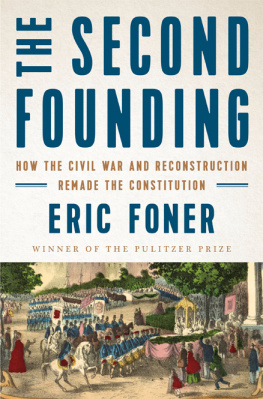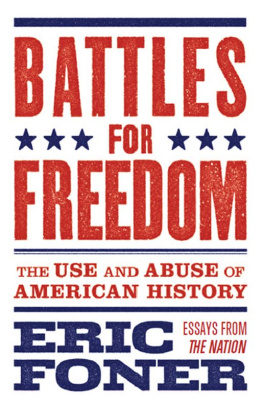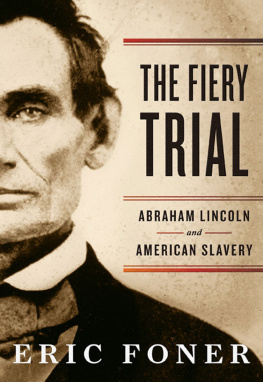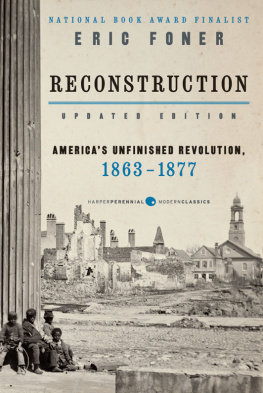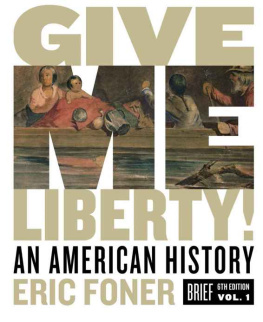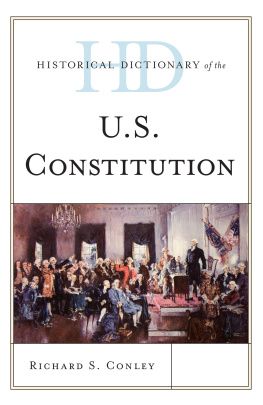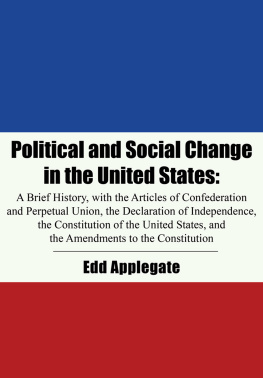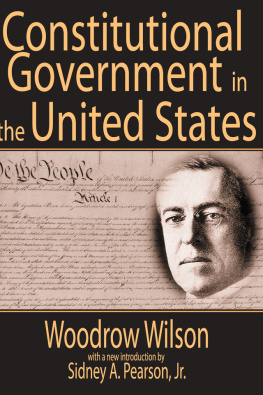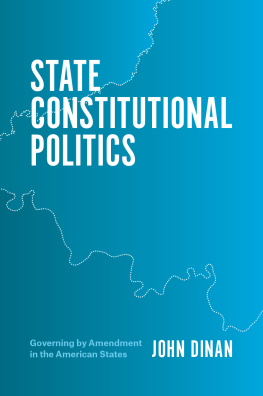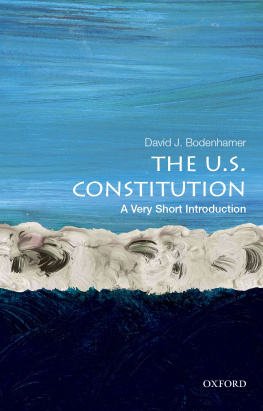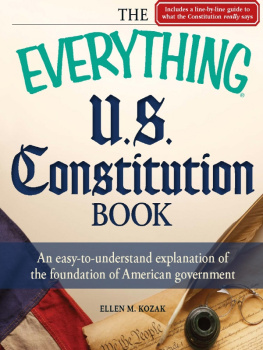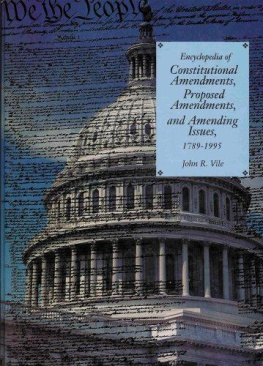Contents

THE
SECOND
FOUNDING

ALSO BY ERIC FONER
Free Soil, Free Labor, Free Men:
The Ideology of the Republican Party Before the Civil War (1970)
Americas Black Past: A Reader in Afro-American History (editor, 1971)
Nat Turner (editor, 1971)
Tom Paine and Revolutionary America (1976)
Politics and Ideology in the Age of the Civil War (1980)
Nothing But Freedom: Emancipation and Its Legacy (1983)
Reconstruction: Americas Unfinished Revolution 18631877 (1988)
A Short History of Reconstruction (1990)
A House Divided: America in the Age of Lincoln (with Olivia Mahoney, 1990)
The New American History (editor, 1990; rev. ed. 1997)
The Readers Companion to American History (editor, with John A. Garraty, 1991)
Freedoms Lawmakers: A Directory of Black Reconstruction Officeholders
(1993; rev. ed. 1996)
Thomas Paine (editor, 1995)
Americas Reconstruction: People and Politics after the Civil War
(with Olivia Mahoney, 1995)
The Story of American Freedom (1998)
Who Owns History? Rethinking the Past in a Changing World (2002)
Give Me Liberty! An American History (2004)
Voices of Freedom: A Documentary History (editor, 2004)
Forever Free: The Story of Emancipation and Reconstruction (2005)
Herbert Aptheker on Race and Democracy: A Reader
(editor, with Manning Marable, 2006)
Our Lincoln: New Perspectives on Lincoln and His World (editor, 2008)
The Fiery Trial: Abraham Lincoln and American Slavery (2010)
American History Now (editor, with Lisa McGirr, 2011)
Gateway to Freedom: The Hidden History of the Underground Railroad (2015)
Battles for Freedom: The Use and Abuse of American History (2017)
ERIC FONER

THE
SECOND
FOUNDING
How the Civil War and Reconstruction
Remade the Constitution


W. W. NORTON & COMPANY
Independent Publishers Since 1923
Copyright 2019 by Eric Foner
All rights reserved
First Edition
For information about permission to reproduce selections from this book, write to
Permissions, W. W. Norton & Company, Inc., 500 Fifth Avenue, New York, NY 10110
For information about special discounts for bulk purchases, please contact
W. W. Norton Special Sales at specialsales@wwnorton.com or 800-233-4830
Book design by Brooke Koven
Production manager: Anna Oler
The Library of Congress has cataloged the printed edition as follows:
Names: Foner, Eric, 1943
Title: The second founding : how the Civil War and Reconstruction remade the
constitution / Eric Foner.
Description: First edition. | New York, NY : W.W. Norton & Company, 2019. |
Includes bibliographical references and index.
Identifiers: LCCN 2019014793 | ISBN 9780393652574 (hardcover)
Subjects: LCSH: Constitutional historyUnited States19th century. | United States.
Constitution. 13th15th Amendments | Reconstruction (U.S. history, 18651877)
Influence. | United StatesHistoryCivil War, 1861-1865Law and legislation.
Classification: LCC KF4541 .F68 2019 | DDC 342.73dc23
LC record available at https://lccn.loc.gov/2019014793
ISBN 9780393652581 (ebook)
W. W. Norton & Company, Inc., 500 Fifth Avenue, New York, N.Y. 10110
www.wwnorton.com
W. W. Norton & Company Ltd., 15 Carlisle Street, London W1D 3BS
For Daria and Kjell
CONTENTS
The Reconstruction
Amendments

THIRTEENTH AMENDMENT
SECTION 1.
Neither slavery nor involuntary servitude, except as a punishment for crime whereof the party shall have been duly convicted, shall exist within the United States, or any place subject to their jurisdiction.
SECTION 2.
Congress shall have power to enforce this article by appropriate legislation.
FOURTEENTH AMENDMENT
SECTION 1.
All persons born or naturalized in the United States, and subject to the jurisdiction thereof, are citizens of the United States and of the State wherein they reside. No State shall make or enforce any law which shall abridge the privileges or immunities of citizens of the United States; nor shall any State deprive any person of life, liberty, or property, without due process of law; nor deny to any person within its jurisdiction the equal protection of the laws.
SECTION 2.
Representatives shall be apportioned among the several States according to their respective numbers, counting the whole number of persons in each State, excluding Indians not taxed. But when the right to vote at any election for the choice of electors for President and Vice President of the United States, Representatives in Congress, the executive and judicial officers of a State, or the members of the legislature thereof, is denied to any of the male inhabitants of such State, being twenty-one years of age, and citizens of the United States, or in any way abridged, except for participation in rebellion, or other crime, the basis of representation therein shall be reduced in the proportion which the number of such male citizens shall bear to the whole number of male citizens twenty-one years of age in such State.
SECTION 3.
No person shall be a Senator or Representative in Congress, or elector of President and Vice President, or hold any office, civil or military, under the United States, or under any State, who, having previously taken an oath, as a member of Congress, or as an officer of the United States, or as a member of any State legislature, or as an executive or judicial officer of any State, to support the Constitution of the United States, shall have engaged in insurrection or rebellion against the same, or given aid or comfort to the enemies thereof. But Congress may by a vote of two-thirds of each House, remove such disability.
SECTION 4.
The validity of the public debt of the United States, authorized by law, including debts incurred for payment of pensions and bounties for services in suppressing insurrection or rebellion, shall not be questioned. But neither the United States nor any State shall assume or pay any debt or obligation incurred in aid of insurrection or rebellion against the United States, or any claim for the loss or emancipation of any slave; but all such debts, obligations and claims shall be held illegal and void.
SECTION 5.
The Congress shall have power to enforce, by appropriate legislation, the provisions of this article.
FIFTEENTH AMENDMENT
SECTION 1.
The right of citizens of the United States to vote shall not be denied or abridged by the United States or by any State on account of race, color, or previous condition of servitude.
SECTION 2.
The Congress shall have the power to enforce this article by appropriate legislation.
T HE C IVIL War and the Reconstruction period that followed form the pivotal era of American history. The war destroyed the institution of slavery, ensured the survival of the Union, and set in motion economic and political changes that laid the foundation for the modern nation. During Reconstruction, the United States made its first attempt, flawed but truly remarkable for its time, to build an egalitarian society on the ashes of slavery. Some of the problems of those years haunt American society todayvast inequalities of wealth and power, terrorist violence, aggressive racism. But perhaps the eras most tangible legacies are the Thirteenth, Fourteenth, and Fifteenth Amendments to the United States Constitution. The Thirteenth irrevocably abolished slavery. The Fourteenth constitutionalized the principles of birthright citizenship and equality before the law and sought to settle key issues arising from the war, such as the future political role of Confederate leaders and the fate of Confederate debt. The Fifteenth aimed to secure black male suffrage throughout the reunited nation.

